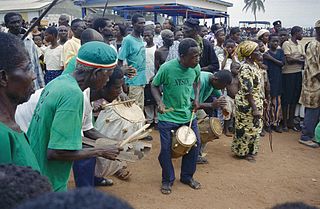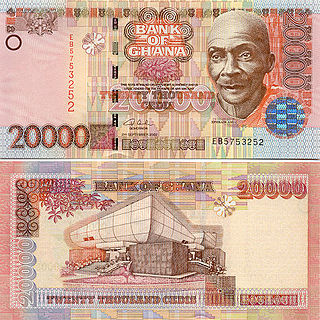
The term African fiddle may be applied to any of several African bowed string instruments.

The term African fiddle may be applied to any of several African bowed string instruments.
Self-described "culture bearer" [7] Jacqueline Cogdell DjeDje of the University of California, Los Angeles [2] broke new ground in ethnomusicology with her study of "fiddle" music of the Luo of Kenya. Citing Kwame Anthony Appiah, she rejects "nativist nostalgia . . . largely fueled by that Western sentimentalism so familiar after Rousseau". [8] This is consistent with trends which urge caution when introjecting cultural stereotypes. [9] Following her earlier academic studies, she released Fiddling in West Africa Touching the Spirit in Fulbe, Hausa, and Dagbamba Cultures in 2008. [10]
Noise Khanyile & the Jo'burgm C is a Johannesburg, South Africa based ensemble produced by West Nkosi that has been critically acclaimed.[ citation needed ] They exhibit a sophisticated multiply layered tapestry of Zulu inspired sound on his 1989 release Art of Noise. [11]
Moses Mchuno's township jive track incorporates fiddle and traditional Soweto singing. [12]

A fiddle is a bowed string musical instrument, most often a violin. It is a colloquial term for the violin, used by players in all genres, including classical music. Although in many cases violins and fiddles are essentially synonymous, the style of the music played may determine specific construction differences between fiddles and classical violins. For example, fiddles may optionally be set up with a bridge with a flatter arch to reduce the range of bow-arm motion needed for techniques such as the double shuffle, a form of bariolage involving rapid alternation between pairs of adjacent strings. To produce a "brighter" tone, compared to the deeper tones of gut or synthetic core strings, fiddlers often use steel strings. The fiddle is part of many traditional (folk) styles, which are typically aural traditions—taught "by ear" rather than via written music.

Ethnomusicology is the study of music from the cultural and social aspects of the people who make it. It encompasses distinct theoretical and methodical approaches that emphasize cultural, social, material, cognitive, biological, and other dimensions or contexts of musical behavior, in addition to the sound component.

The Aburukuwa is an open drum of the Akan people and the Asante people of Ghana. It is a high-pitched talking drum used by the Akan people, bottle-shaped with its skin is held on by pegs. It is usually played with curved sticks. Its sound resembles the birdsong of a bird of the same name.
Olatunji Akin Euba, was a Nigerian composer, musicologist, and pianist.

John Collins is a UK-born guitarist, harmonica player and percussionist who first went to Ghana as a child in 1952 for a brief period and later became involved in the West African music scene after returning to Ghana in 1969.

Ephraim Kɔku Amu was a Ghanaian composer, musicologist and teacher.
Cynthia Tse Kimberlin is an American ethnomusicologist. She is the executive director and publisher of the Music Research Institute and MRI Press, based in Point Richmond, California. Her primary area of expertise is the music of Africa, in particular Ethiopia and Eritrea.
James K. Makubuya is a Ugandan-born ethnomusicologist, instrumentalist, singer, dancer, and choreographer. He plays several traditional instruments from various parts of Uganda, including the endongo and adungu, endingidi, amadinda, akogo (lamellaphone), and engoma (drums). Makubuya was born in the town of Gayaza, and is a member of the Baganda ethnic group. He holds a B.A. in music and English literature from Makerere University in Kampala, Uganda (1980); a Master of Music degree in Western music and music education from Catholic University of America in Washington D.C. (1988), and a Ph.D. in ethnomusicology from the University of California, Los Angeles (1995).

Koo Nimo, baptized Daniel Amponsah is a leading folk musician of Palm wine music or Highlife music from Ghana.
Joseph Hanson Kwabena Nketia was a Ghanaian ethnomusicologist and composer. Considered Africa's premier musicologist, during his lifetime, he was called a "living legend" and "easily the most published and best known authority on African music and aesthetics in the world", with more than 200 publications and 80 musical compositions to his credit.
"Ory's Creole Trombone" is a jazz composition by Kid Ory. Ory first recorded it in Los Angeles in 1921. The band included Ory on trombone, Mutt Carey on cornet, Dink Johnson on clarinet, Fred Washington on piano, Ed Garland on bass and Ben Borders on drums. The recording of "Ory's Creole Trombone" was released by John and Reb Spikes' short-lived Sunshine Records label. It was the first issued recording session by an African American jazz band from New Orleans. Other numbers recorded the same day included "When You're Alone Blues", "Krooked Blues", "Society Blues", "That Sweet Something Dear", "Maybe Some Day" and "Froggie Moore".

Old time fiddle is a genre of American folk music. "Old time fiddle tunes" derived from European folk dance tunes such as Jig, Reel, Breakdown, Schottische, Waltz, Two Step and Polka. The fiddle may be accompanied by banjo or other instruments but are nevertheless called "fiddle tunes". The genre traces from the colonization of North America by immigrants from England, France, Germany, Ireland, and Scotland. It is separate and distinct from traditions which it has influenced or which may in part have evolved from it, such as bluegrass, country blues, variants of western swing and country rock.
Métis fiddle is the style that the Métis of Canada and Métis in the northern United States have developed to play the violin, solo and in folk ensembles. It is marked by the percussive use of the bow and percussive accompaniment. The Metis people are a poly-ethnic post-contact Indigenous peoples. Fiddles were "introduced in this area by Scottish and French-Canadian fur traders in the early 1800s", where the Metis community adopted the instrument into their culture.
Quebec fiddle is a part of the Old time fiddle canon and is influential in New England and Northwest fiddle styles.

M.anifest is a Ghanaian rapper, singer and songwriter.
The Pan-African Orchestra (PAO) is an orchestra using indigenous African traditions and instruments. It was founded as a 48-piece ensemble in 1988 in Accra, Ghana, by Nana Danso Abiam. Abiam died in a motor accident in Accra on 24 December 2014, in the early hours following his 61st birthday. His mission with the PAO, originally a 30-piece ensemble, had been to explore the classical foundations of traditional African music and to cultivate an integrated continental art form through new compositional and orchestral techniques. The musicians play traditional instruments from across Africa, including the atenteben, gonje, kora and gyile.
The Presbyterian College of Education, Akropong, is a co-educational teacher-training college in Akropong in the Akwapim district of the Eastern Region of Ghana. It has gone through a series of previous names, including the Presbyterian Training College, the Scottish Mission Teacher Training College, and the Basel Mission Seminary. The college is affiliated to the University of Education, Winneba.